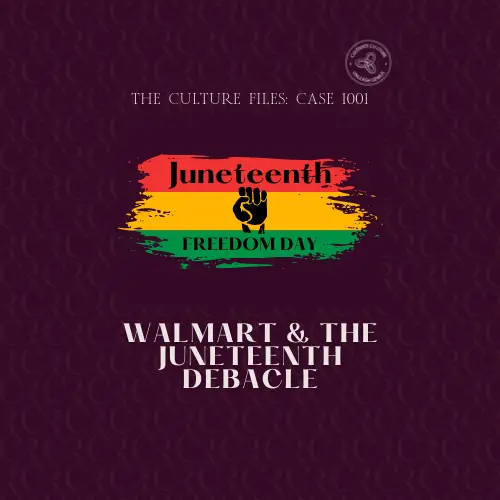Walmart and the Juneteenth Debacle
On June 17, 2021, US President Joe Biden declared Juneteenth a federal holiday. While, this holiday may have been new to some, for many in the African American community Juneteenth is considered the longest-running African American holiday for direct descendants of slavery in the US. For the first time, organizations around the country were able to jump at the opportunity to capitalize on this day in a way they weren’t able to before. A day off without actually recognizing what the day truly means, a new marketing gimmick that meant they could take advantage of a history they have no reverence of or connection to. Too often, Black culture is appropriated for gain without respect because it’s in vogue to do so, or people believe they can garner sales by exploiting a culture they don’t even care to educate themselves on.
This past weekend was the second federally recognized Juneteenth celebration and for many, the weekend was full of festivities. While each family and community might celebrate Juneteenth differently, there are some traditions, such as barbecues, flag raisings, Miss Juneteenth contests, and more, that have become popular across the United States and beyond. For those who are able to trace their heritage back to the Trans-Atlantic slave trade, celebrating Juneteenth is not new because it has a unique meaning to them, personally. Freedom from slavery for their ancestors created a ripple effect for these communities to now reap the benefit of the Emancipation Proclamation and more (though the fight for true liberation continues). As celebrating Juneteenth has become part of the norm, we also see other Black Americans who don’t have these connections with slavery begin to join in. And while it might not quite hit the same way for them, they are able to come in and join the festivities and be educated more fully.
These celebrations and traditions have become so popular in the mainstream of our society, but it has come with a price: corporate America has come in to take a slice of the pie and enter into a space where they haven’t earned the right to be. While these organizations may see themselves as standing in solidarity with the Black community, we are often left shaking our heads at the insensitive, stereotypical products that have been rolled out onto the shelves.
And let’s be honest, whenever Black History month or Juneteenth comes around, many Black Americans let out a collective sigh and roll our eyes when we see organizations appropriating and capitalizing on our culture in the name of “celebration” yet again.
The latest in the list of attempts to join in the celebration was released by Walmart. Under their Great Value brand, they released a red velvet and cheesecake flavored ice cream called, “Celebration Edition: Juneteenth Ice Cream,” with the subtitle “Share and celebrate African-American culture, emancipation, and enduring hope.” The attempt at solidarity quickly faced fury across social media, which resulted in the supply chain giant recalling the ice cream and issuing an apology.
Walmart was not the only company this year to have to issue an apology for its insensitive attempt at celebrating. The Children’s Museum of Indiana issued an apology for its watermelon salad that was supposed to be promoting their upcoming “Juneteenth Jamboree”, but instead sparked a backlash that resulted in the menu item being pulled and the museum apologizing.
Sadly, these are simply the latest in a long line of offenses and we are faced with (yet again) the question of “why does this keep happening, and what should’ve been done instead?” Something has to change.
The cultural stereotypes that are promoted are just that: stereotypes. They don’t show the depth and uniqueness that is rich in our communities and our heritage. And it’s offensive and hurtful to continue in the shallowness that these stereotypes are. It isn’t enough to label something as part of a Juneteenth celebration and then put a kente cloth (or just use the colors) on the product or to use traditional African patterns or representative color combinations on the product. We are more than a stereotypical flavor or food type, such as watermelon, fried chicken, or greens.
Time and again, we have seen other companies do the same thing by continuing to promote cultural stereotypes, instead of allowing themselves to be educated by bringing Black voices. Note we said voices, with an “s” because one voice in the room is not nearly enough. While many organizations preach diversity, equality, and inclusivity, it often stops at the lower and middle levels and never makes its way to the top, to where the discussions are had and decisions are made. They may have an ethnically diverse workforce in the storefronts and offices, but does that actually mean anything if it isn’t the same way in the boardroom? And if the boardroom is as diverse as the storefronts and offices, is it a place where people can come and voice concern or dissent without fear of repercussions?
How can a cultural transformation happen? How can these organizations use their platforms to truly make a difference and actually celebrate the cultures they claim to love in an authentic, non-offensive way?
In the case of Walmart and the Juneteenth ice cream, they had a few options that they absolutely should have taken.
Option 1: DON’T. Just don’t. If they had taken the time to bring in multiple Black voices (again, because we are not a monolith) to share their opinions and ideas, they would’ve known this would spark fury and hurt over their lack of sensitivity. Simply using the colors associated with the African American Flag? That is not how you honor Black people, our histories, and the stories that come with it. It’s a shallow attempt at acknowledging the existence of Juneteenth and does nothing except acknowledge the fact that they know the colors of a flag.
Option 2: Promote Black-owned and run brands and businesses. If they truly wanted to stand in solidarity with the Black community, they should have taken the opportunity to elevate Black businesses and Black voices. Creamalicous is one of the only Black-owned, nationally produced ice cream brands, owned and founded by Chef Liz Rogers. Chef Rogers honors her favorite childhood treats and traditional Southern desserts with flavor names like “Slap Yo Mamma Banana Pudding”, “Right As Rain Red Velvet Cheesecake”, and so many more. Creamalicious is sold at grocery retailers like Target, Meijer, Schnucks, AND Walmart. If Walmart truly wanted the right to be in this space, they could’ve earned the right by partnering with Chef Rogers and promoting Creamalicious instead of putting their own offensive spin on a copycat ice cream. We see other organizations, especially Target who do a great job at highlighting and elevating Black-owned and founded businesses, not just for a holiday, but year-round. Walmart certainly should’ve taken a queue from them in this situation.
Option 3: Donate proceeds. Other companies, such as Ben and Jerry’s, have in the past chosen donate the profits from their ice cream to organizations directly supporting the community, such as the Juneteenth Foundation, and use this opportunity to educate themselves and their employees on the importance of Juneteenth. This would have been a great opportunity for Walmart to transform their organization’s culture to bring more Black voices to the table so debacles like this don’t happen again.
At the bare minimum, this was a learning opportunity for Walmart as they missed the mark and opportunity to honor the Black community. Juneteenth is a celebration of freedom from slavery and an opportunity for growth and education. The Black community didn’t need nor ask for a special flavor of ice cream or any other patronizing product. What we ask for is respect, equality, and opportunities for our own voices to be heard and promoted. We don’t want to be spoken for. We want to speak for ourselves, our families, and our communities. Our voices have been stifled and shouted down for the past several hundred years. Businesses can and should open their platforms to collaborate and uplift Black-owned businesses for their voices to be heard. We don’t need to be spoken for or told how we can or can’t show up. We don’t need to and will not stay in standing-room-only areas when we rightfully deserve to take up space at the decision table.
We can speak for ourselves. We can celebrate ourselves. And we don’t need some copy-cat ice cream to “celebrate” our culture.
The Culture Files is a Culture Refinery blog series of case studies examining current (and sometimes past) missteps and providing insights on alternate approaches. Subscribe to our blog to ensure you don’t miss the next case in the series.




